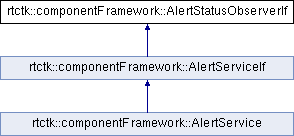Interface to observe alert status. More...
#include <alertServiceIf.hpp>
Inheritance diagram for rtctk::componentFramework::AlertStatusObserverIf:

Classes | |
| struct | AlertStatus |
| Structure describing an alert condition with status from the corresponding AlertSource. More... | |
Public Types | |
| using | ReducedStatus = std::optional< bool > |
| Represents current alert status. More... | |
| using | TimePoint = std::chrono::system_clock::time_point |
| Timestamp type used throughout AlertServiceIf. More... | |
Public Member Functions | |
| virtual | ~AlertStatusObserverIf () noexcept=default |
Accessors | |
| virtual ReducedStatus | GetReducedStatus () const =0 |
| Get the reduced status. More... | |
| virtual std::vector< AlertStatus > | GetAlertStatuses () const =0 |
| Get status of all alert conditions. More... | |
Signals | |
| using | ReducedStatusSignal = boost::signals2::signal< void(ReducedStatus const &, std::vector< AlertStatus > const &)> |
| Signal emitted for every change in reduced alert status. More... | |
| virtual boost::signals2::connection | ConnectReducedStatus (ReducedStatusSignal::slot_type slot)=0 |
| Connects a slot to the reduced alert signal. More... | |
Detailed Description
Interface to observe alert status.
Member Typedef Documentation
◆ ReducedStatus
| using rtctk::componentFramework::AlertStatusObserverIf::ReducedStatus = std::optional<bool> |
Represents current alert status.
- boolean
truemeans there is at least one AlertSource with an active alert. - boolean
falsemeans all AlertSources are inactive. std::nulloptmeans the status is indeterminate.
◆ ReducedStatusSignal
| using rtctk::componentFramework::AlertStatusObserverIf::ReducedStatusSignal = boost::signals2::signal<void( ReducedStatus const&, std::vector<AlertStatus> const&)> |
Signal emitted for every change in reduced alert status.
The reduced signal is the reduced status of all alert sources, combined as follows:
- Any AlertSource active -> Alert active.
- All AlertSources inactive -> Alert inactive.
Signal arguments are:
- Reduced alert status.
- Active alert sources.
◆ TimePoint
| using rtctk::componentFramework::AlertStatusObserverIf::TimePoint = std::chrono::system_clock::time_point |
Timestamp type used throughout AlertServiceIf.
Constructor & Destructor Documentation
◆ ~AlertStatusObserverIf()
|
virtualdefaultnoexcept |
Member Function Documentation
◆ ConnectReducedStatus()
|
pure virtual |
Connects a slot to the reduced alert signal.
See ReducedStatusSignal for description.
- Parameters
-
slot signal slot invoked by unspecified thread when reduced status signal is emitted.
- Returns
- connection management object that allows caller to disconnect slot from signal.
Implemented in rtctk::componentFramework::AlertService.
◆ GetAlertStatuses()
|
pure virtual |
Get status of all alert conditions.
- Returns
- vector of all Alerts and their current status as provided by the corresponding AlertSource.
Implemented in rtctk::componentFramework::AlertService.
◆ GetReducedStatus()
|
pure virtual |
Get the reduced status.
Implemented in rtctk::componentFramework::AlertService.
The documentation for this class was generated from the following file:
- componentFramework/services/alert/src/include/rtctk/componentFramework/alertServiceIf.hpp